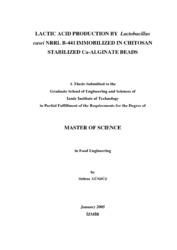Please use this identifier to cite or link to this item:
https://hdl.handle.net/11147/3269| Title: | Lactic Acid Production by Lactobacillus Casei Nrrl B-441 Immobilized in Chitosan Stabilized Ca-Alginate Beads | Authors: | Gündüz, Meltem | Advisors: | Harsa, Hayriye Şebnem | Publisher: | Izmir Institute of Technology | Abstract: | Having two optically active forms, D(-) and L(+) lactic acid has long been used in the food, chemical, textile, pharmaceutical and other industries. 90 % of the worldwide production of lactic acid is by bacterial fermentation. Recently, there is an increasing interest in the production of L(+) lactic acid, since it is a potential substrate for polylactic acid that is biocompatible and can be used for medical purposes. Whey, which is a by-product of dairy industry, contains approximately 5 % (w/v) lactose. Since whey has a high BOD content, it possesses serious environmental problems. Whey lactose is a good substrate for lactic acid bacteria and can be used for L(+) lactic acid fermentations. This study focuses on the production of lactic acid from whey by Lactobacillus casei NRRL B-441 immobilized in chitosan stabilized Ca-alginate beads. Higher lactic acid production and lower cell leakage were observed with alginate-chitosan beads compared with Ca-alginate beads. The highest lactic acid (131.2 g/l) was obtained with cells entrapped in 1.3-1.7 mm alginate-chitosan beads prepared from 2 % Na-alginate. acid production and lower cell leakage were observed with alginate-chitosan beads compared with Ca-alginate beads. The highest lactic acid (131.2 g/l) was obtained with cells entrapped in 1.3-1.7 mm alginate-chitosan beads prepared from 2 % Na-alginate. The gel beads produced lactic acid for 10 consecutive batch fermentations without marked activity loss and deformation. Response surface methodology was used to investigate the effects of three fermentation parameters (initial sugar, yeast extract and calcium carbonate concentrations) on the concentration of lactic acid. No previous work has used statistical analysis in determining the interactions among these variables in lactic acid production by immobilized cells. Results of the statistical analysis showed that the fit of the model was good in all cases. Initial sugar, yeast extract and calcium carbonate concentrations had strong linear effects on lactic acid production. Maximum lactic acid concentration of 136.3 g/l was obtained at the optimum levels of process variables (initial sugar concentration.147.35 g/l, yeast extract concentration. 28.81 g/l, CaCO3 concentration.97.55 g/l). These values were obtained by fitting of the experimental data to the model equation. The response surface methodology was found to be useful in optimizing and determining the interactions among process variables in lactic acid production using alginate-chitosan immobilized cells. | Description: | Thesis (Master)--Izmir Institute of Technology, Food Engineering, Izmir, 2005 Includes bibliographical references (leaves: 56-62) Text in English; Abstract: Turkish and English xii, 65 leaves |
URI: | http://hdl.handle.net/11147/3269 |
| Appears in Collections: | Master Degree / Yüksek Lisans Tezleri |
Files in This Item:
| File | Description | Size | Format | |
|---|---|---|---|---|
| T000427.pdf | MasterThesis | 1.85 MB | Adobe PDF |  View/Open |
CORE Recommender
Page view(s)
556
checked on Jul 7, 2025
Download(s)
286
checked on Jul 7, 2025
Google ScholarTM
Check
Items in GCRIS Repository are protected by copyright, with all rights reserved, unless otherwise indicated.